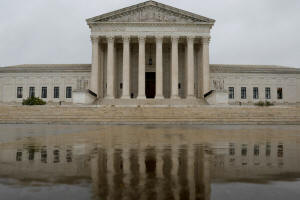Supreme Court leans toward limiting judicial scrutiny of U.S. elections
 Send a link to a friend
Send a link to a friend
 [December 08, 2022]
By Andrew Chung and Nate Raymond [December 08, 2022]
By Andrew Chung and Nate Raymond
WASHINGTON (Reuters) -The U.S. Supreme Court's conservative majority on
Wednesday appeared to ready to limit judicial power to overrule voting
policies crafted by state politicians but might not go as far as
Republican North Carolina lawmakers want in a case the liberal justices
painted as a threat to American democratic norms.
The court heard arguments in a case the state lawmakers have used to try
to persuade the justices to endorse a contentious legal theory gaining
traction in conservative legal circles that would prevent state courts
from reviewing the legality of actions by state legislatures regulating
federal elections.
The Republican lawmakers are appealing the top North Carolina court's
decision to throw out the map they devised for the state's 14 U.S. House
of Representatives districts as unlawfully biased against Democratic
voters. Another state court then replaced that map with one drawn by a
bipartisan group of experts.

The Supreme Court has a 6-3 conservative majority, and its most
conservative justices including Samuel Alito, Clarence Thomas and Neil
Gorsuch appeared willing to embrace the "independent state legislature"
doctrine presented by the Republican legislators.
While the conservative justices in general asked questions that
indicated skepticism toward the state court actions, some signaled that
the Republican argument that state constitutions cannot constrain the
power of legislatures in setting rules for congressional and
presidential elections might go too far.
Under the once-marginal legal theory they are now promoting, the
lawmakers argue that the U.S. Constitution gives state legislatures -
and not other entities such as state courts - authority over election
rules and electoral district maps.
The court's liberal justices suggested the doctrine could free
legislatures to adopt all manner of voting restrictions. Lawyers arguing
against it also said it could sow confusion by allowing voting rules
that vary between state and federal contests.
"This is a proposal that gets rid of the normal checks and balances on
the way big governmental decisions are made in this country," liberal
Justice Elena Kagan said, referring to the interaction between the
executive, legislative and judicial branches of government. "And you
might think that it gets rid of all those checks and balances at exactly
the time when they are needed most."
America is sharped divided over voting rights. Republican-led state
legislatures have pursued new voting restrictions in the aftermath of
Republican former President Donald Trump's false claims that the 2020
election was stolen from him through widespread voting fraud.
The court's eventual decision, due by the end of June, could apply to
2024 elections including the U.S. presidential race.
During the three-hour argument, the justices touched on the issue of
enabling federal courts to review state court actions to ensure that
judges do not behave like legislators or unfairly apply vague state
constitutional provisions such as those requiring free and fair
elections to disempower lawmakers.
Conservative Chief Justice John Roberts wondered whether such broadly
worded provisions provide proper "standards and guidelines" for state
courts to apply.
ALITO WEIGHS IN
Alito dismissed arguments that legislatures would be unchecked if the
Republican position carried the day.
[to top of second column]
|

A general view of the U.S. Supreme Court
building in the rain the day before the start of the court's new
term in Washington, U.S. October 2, 2022. REUTERS/Jonathan Ernst

"Under any circumstances, no matter what we say the 'Elections
Clause' means, Congress can always come in and establish the manner
of conducting congressional elections," Alito said, referring to the
Constitution's elections language.
The doctrine is based in part on the Constitution's statement that
the "times, places and manner" of federal elections "shall be
prescribed in each state by the legislature thereof." The Republican
lawmakers argued that the state court usurped the North Carolina
General Assembly's authority under that provision to regulate
federal elections.
Kagan said the theory would free state legislators to engage in the
"most extreme forms of gerrymandering" - drawing electoral districts
to unfairly improve a party's election chances - while enacting "all
manner of restrictions on voting," noting that lawmakers by virtue
of coveting re-election may have incentives to suppress, dilute and
negate votes.
Kagan said the theory also could let legislatures insert themselves
into the process of determining winners in federal elections - a
sensitive issue following the Jan. 6, 2021, U.S. Capitol attack by
Trump supporters who sought to block congressional certification of
Biden's 2020 election victory.
'HISTORICAL PRACTICE'
Some conservative justices appeared to balk at aspects of the
Republican arguments.
Justice Brett Kavanaugh emphasized the "historical practice" that
"nearly all state constitutions regulate federal elections in some
way." Roberts said another check on a legislature's power - a state
governor's veto - "significantly undermines the argument that it can
do whatever it wants."
David Thompson, arguing for the North Carolina lawmakers, said the
Constitution "requires state legislatures specifically to perform
the federal function of prescribing regulations for federal
elections. States lack the authority to restrict the legislature's
substantive discretion when performing this federal function."

Kavanaugh told Thompson that his position on the theory's breadth
"seems to go further" than that conceived by then-Chief Justice
William Rehnquist in a concurrence to a 2000 ruling deciding a
presidential election's outcome - an opinion seeing state courts as
exceeding their authority on federal elections.
North Carolina's Department of Justice is defending the state high
court's February ruling alongside the voters and voting rights
groups that challenged the map approved by the legislature in
November 2021. They are backed by Democratic President Joe Biden's
administration.
Elizabeth Prelogar, arguing for Biden's administration, said
empowering state legislatures the way the Republicans want would
"wreak havoc in the administration of elections across the nation"
and cause federal courts to become flooded with lawsuits concerning
state-administered elections.
(Reporting by Andrew Chung in Washington and Nate Raymond in Boston;
Editing by Will Dunham)
[© 2022 Thomson Reuters. All rights
reserved.]
This material may not be published,
broadcast, rewritten or redistributed.
Thompson Reuters is solely responsible for this content. |